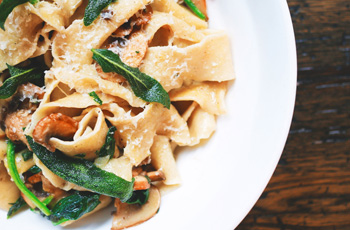
Fast forward to my life now as a dietitian with a passion for working with current student athletes, and I realize the silliness of my carb loading, especially given the fact I sprinted for maybe 90 seconds at the average meet.
The truth is, different types of sports (power sports vs. endurance sports), and even positions within the same sport, require different types and ratios of fuel. Simply put, recommendations won’t be the same for let’s say a body builder compared to a long-distance runner.
Carbohydrates (e.g., whole grains, pasta, fruit, vegetables, low-fat milk) are vital for supplying energy, and are the primary fuel for workouts and games. The amount we need, however, varies by the length of time and intensity we’re training or competing. Consider this chart for some general recommendations:
| CARBOHYDRATES | |
| Training time per day | Daily grams of CARBS per pound of body weight |
| 1 hour moderate | 2g – 2.5g |
| 1 hour intense | 3g |
| 1-2 hours | 3.5g – 4g |
| 2-4 hours | 4 – 4.5g |
| Ultra endurance | 4 – 5.5g |
Combined with carbohydrates, protein found in lean meats, eggs, low-fat dairy, beans, nuts and seeds is another vital nutrient. Protein helps promote muscle repair and growth, as well as strengthens the immune system. For recommendations on protein needs, see the table below:
| PROTEIN | |
| Type of training | Daily grams of PROTEIN per pound of body weight |
| Endurance | 0.54 – 0.64 |
| Power (muscle gain) | 0.72g – 0.81g |
| Power (maintenance) | 0.54g – 0.64g |
| Power (weight restricted) | 0.63g – 0.81g |
You can learn more about what to eat before, during and after competition by visiting USDA.org.
To discover how Holland Hospital can tailor your diet to improve athletic performance, call (616) 394.3344 for an appointment or more information.
Beth